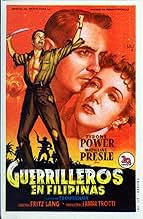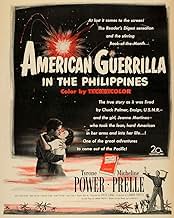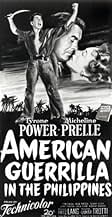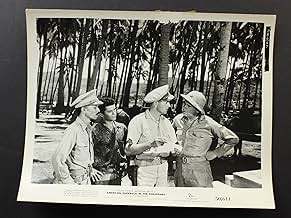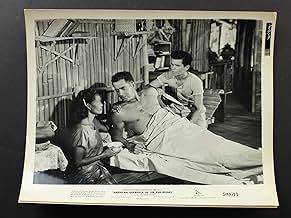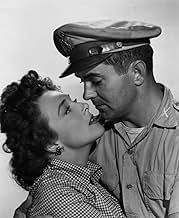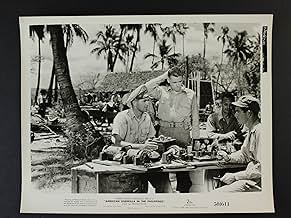NOTE IMDb
5,9/10
1,4 k
MA NOTE
Les soldats américains bloqués aux Philippines après l'invasion japonaise forment des bandes de guérilla pour se défendre.Les soldats américains bloqués aux Philippines après l'invasion japonaise forment des bandes de guérilla pour se défendre.Les soldats américains bloqués aux Philippines après l'invasion japonaise forment des bandes de guérilla pour se défendre.
- Réalisation
- Scénario
- Casting principal
Micheline Presle
- Jeanne Martinez
- (as Micheline Prelle)
Robert Patten
- Lovejoy
- (as Bob Patten)
Miguel Anzures
- Native Traitor
- (non crédité)
Sabu Camacho
- Bo
- (non crédité)
Erlinda Cortes
- Partisan
- (non crédité)
Cris de Vera
- Japanese Officer
- (non crédité)
Rosa Del Rosario
- Partisan
- (non crédité)
Maria del Val
- Señora Martinez - the Aunt
- (non crédité)
Vic Diaz
- Japanese General
- (non crédité)
Arling Gonzales
- Radio Operator
- (non crédité)
Fred Gonzales
- Radio Operator
- (non crédité)
Eddie Infante
- Col. Dimalanta
- (non crédité)
Avis à la une
There were hundreds of these cheap-ish World War Two quickies in the decade following the close of the conflict itself. They differed little from those produced during the war, still being in a kind of adulatory propagandistic mode, except that they were a little more vague usually having no direct message. What's more, as more time went by the seemed to get further and further from the realities of the conflict.
An American Guerrilla in the Philippines sees Tyrone Power, swashbuckling idol of the pre-war years, as an officer battling Japs in the Philippine jungle. Power has matured as an actor since his pictures a decade earlier, appearing tougher and less boyish, although he has also become less interesting in the process. His performance is steady and natural, but he is unable to make anything of what is admittedly a rather bland character on paper anyway. His buddy Tom Ewell is an unusual addition to the cast. He was in later years a very fine comedy actor, but it's hard to tell if he's appearing here as comic relief or not. In some moments, such as his burbling in the water trying to stay afloat, seem as if he is trying to play them for laughs, inappropriately if so, and certainly not at all funny. The rest of the cast is simply plain bad or plain boring.
Director Fritz Lang is normally someone who can give a nice baroque touch to even the most American of film formats, while still remain true to genre and tone. He seems uncertain however quite what to do with this one. He gives many shots in the jungle an abstract feel, with no familiar points of reference, giving them a threateningly wild look. Often his camera takes a spectator's position, peeping out through foliage. It's hard to tell what purpose this serves, as it distances us from the events on screen. Incidentally, Lang was a very good director of crowds and action, as evidenced in his big-budget silent pictures. There are some very powerful moments, with characters moving straight towards us down the middle of the shot and memorably stylised movements. However for a director who is normally so good at imbuing his work with a dark and nightmarish feel, An American Guerrilla in the Philippines has none of the bleak terror of, say, Operation Burma, a picture which really worked because it made us the audience feel lost within the jungle ourselves.
And ultimately An American Guerrilla in the Philippines is too light, and too sparing on any true sense of tragedy. It's lack of a real feeling of danger gives it many dull stretches, and its lack of realism does a disservice to those involved in the conflict. All of which is rather odd because the picture is also far from being a comedy. The only thing which saves it and makes it watchable is Fritz Lang's strong, vibrant imagery, such as dozens of hats waving in the air or a soldier's dying scream just inches from the lens. Having said that, there are far better Fritz Lang pictures to see these brilliant touches in.
An American Guerrilla in the Philippines sees Tyrone Power, swashbuckling idol of the pre-war years, as an officer battling Japs in the Philippine jungle. Power has matured as an actor since his pictures a decade earlier, appearing tougher and less boyish, although he has also become less interesting in the process. His performance is steady and natural, but he is unable to make anything of what is admittedly a rather bland character on paper anyway. His buddy Tom Ewell is an unusual addition to the cast. He was in later years a very fine comedy actor, but it's hard to tell if he's appearing here as comic relief or not. In some moments, such as his burbling in the water trying to stay afloat, seem as if he is trying to play them for laughs, inappropriately if so, and certainly not at all funny. The rest of the cast is simply plain bad or plain boring.
Director Fritz Lang is normally someone who can give a nice baroque touch to even the most American of film formats, while still remain true to genre and tone. He seems uncertain however quite what to do with this one. He gives many shots in the jungle an abstract feel, with no familiar points of reference, giving them a threateningly wild look. Often his camera takes a spectator's position, peeping out through foliage. It's hard to tell what purpose this serves, as it distances us from the events on screen. Incidentally, Lang was a very good director of crowds and action, as evidenced in his big-budget silent pictures. There are some very powerful moments, with characters moving straight towards us down the middle of the shot and memorably stylised movements. However for a director who is normally so good at imbuing his work with a dark and nightmarish feel, An American Guerrilla in the Philippines has none of the bleak terror of, say, Operation Burma, a picture which really worked because it made us the audience feel lost within the jungle ourselves.
And ultimately An American Guerrilla in the Philippines is too light, and too sparing on any true sense of tragedy. It's lack of a real feeling of danger gives it many dull stretches, and its lack of realism does a disservice to those involved in the conflict. All of which is rather odd because the picture is also far from being a comedy. The only thing which saves it and makes it watchable is Fritz Lang's strong, vibrant imagery, such as dozens of hats waving in the air or a soldier's dying scream just inches from the lens. Having said that, there are far better Fritz Lang pictures to see these brilliant touches in.
9w0aq
I caught this movie on the Fox Movie Channel last week. A shame that the DVD is not available as this one would be a keeper. If you like WWII era movies this one is a good one. It documents insurgency activity against the Japanese during the war. A rag-tag group of people including some Americans separated from the rest of their detachment lead locals in a courageous and sometimes complex scheme to keep the enemy unaware of their activities.
This was an easy movie to get into and one I would add to my collection if available. It is in color as well and features some spectacular shots.
This was an easy movie to get into and one I would add to my collection if available. It is in color as well and features some spectacular shots.
Had BACK TO BATAAN and BACK TO BATAAN not been made, then I assume that American GUERILLA IN THE PHILIPPINES would probably be a better remembered film. That's because it's an excellent movie in just about every way, but the earlier John Wayne and Robert Taylor films about the Philippines during WWII were very outstanding films and tend to overshadow this Tyrone Power flick.
While the plot is not identical to these other two films, there are many similarities. All three document the heroic efforts of the Philippino partisans as well as that of Americans stuck in this land during the war. About the only noticeable difference was that the Power film was in color and I really think for this subject matter, black and white actually worked better--looking more like what you'd expect a WWII film to look like. Plus, the other two films are just a little more exciting and involving--but this isn't to say this Power film is bad--it just isn't quite as involving.
Still, among the many, many WWII films, this one is a bit better than average and well worth a peek. And, yes, I also noticed the line that said a Navy Ensign is equivalent to an Army Major! I'm surprised that Power, with his WWII experience, would have said such a stupid line. An ensign is most closely equivalent to an Army Lieutennant--a much lower rank.
While the plot is not identical to these other two films, there are many similarities. All three document the heroic efforts of the Philippino partisans as well as that of Americans stuck in this land during the war. About the only noticeable difference was that the Power film was in color and I really think for this subject matter, black and white actually worked better--looking more like what you'd expect a WWII film to look like. Plus, the other two films are just a little more exciting and involving--but this isn't to say this Power film is bad--it just isn't quite as involving.
Still, among the many, many WWII films, this one is a bit better than average and well worth a peek. And, yes, I also noticed the line that said a Navy Ensign is equivalent to an Army Major! I'm surprised that Power, with his WWII experience, would have said such a stupid line. An ensign is most closely equivalent to an Army Lieutennant--a much lower rank.
Not a bad movie, really. Colorful, exotic locations, educational, some interesting combat scenes. But coming from the director of "Metropolis" and "M"?
It reminds me of an anecdote told by the psychologist who wrote "The Three Christs of Ypsilanti." That's a psychiatric hospital in Michigan. Three patients claimed to be Jesus Christ. The psychologist was watching a film with the one named Louie. Adlai Stevenson, then Governor of Illinois, appeared on the screen. "That's me," cried Louie, "I'm Adlai Stevenson." The psychologist replied, "I thought you were Jesus Christ." "I am," said Louie, "I'm Jesus Christ too -- but I've got to make a living."
Fritz Lang must have had some similar motive for making this rather routine war film. It has every cliché in the book. The romance thrown into the middle of the muddle. The cavalry riding to the rescue at the last possible moment. The acting of the principals is at par, but some of the bits are played by people who seem to have had no training in inducing a suspension of audience disbelief.
The best scene in the film has Tom Ewell (in an uncommonly dramatic part) trying to hide from the Japanese under a rotting log. His bare feet are on an ant hill and soon his skin is crawling with stinging ants while he bites his tongue and prays.
The best performance is given by the Japanese officer. He's great. Sinewy, dapper, ruthless, ironic. Speaking to Michelline Presle, who has been aiding the guerrillas -- "You rike Americans with WHITE FACES, like boiled pork." Marvelous line. (That bleached skin, like blue eyes, is an evolutionary anomaly confined to northwestern Europe.) The guy is fascinating to watch physically, in the way that Jack Palance is.
Minor error. Ty Power and Tom Ewell are reporting on the position and movements of two Japanese destroyers (actually, they look like Geary-class American ships). Power gives the info on the ships to Ewell next to him, who relays it by phone to a radio operator who encodes and transmits it. But the operator isn't sending information on the location of the ships. He keeps sending the word "news" over and over, interspersed with a couple of letter "b"s.
It is not, as I say, a bad movie. It's just done rather by the numbers. A far better job dealing with our defeat in the Phillipines was done by John Ford in "They Were Expendable." This film is worth watching as a description of the very real guerrilla movement that developed in the Islands after that initial defeat.
It reminds me of an anecdote told by the psychologist who wrote "The Three Christs of Ypsilanti." That's a psychiatric hospital in Michigan. Three patients claimed to be Jesus Christ. The psychologist was watching a film with the one named Louie. Adlai Stevenson, then Governor of Illinois, appeared on the screen. "That's me," cried Louie, "I'm Adlai Stevenson." The psychologist replied, "I thought you were Jesus Christ." "I am," said Louie, "I'm Jesus Christ too -- but I've got to make a living."
Fritz Lang must have had some similar motive for making this rather routine war film. It has every cliché in the book. The romance thrown into the middle of the muddle. The cavalry riding to the rescue at the last possible moment. The acting of the principals is at par, but some of the bits are played by people who seem to have had no training in inducing a suspension of audience disbelief.
The best scene in the film has Tom Ewell (in an uncommonly dramatic part) trying to hide from the Japanese under a rotting log. His bare feet are on an ant hill and soon his skin is crawling with stinging ants while he bites his tongue and prays.
The best performance is given by the Japanese officer. He's great. Sinewy, dapper, ruthless, ironic. Speaking to Michelline Presle, who has been aiding the guerrillas -- "You rike Americans with WHITE FACES, like boiled pork." Marvelous line. (That bleached skin, like blue eyes, is an evolutionary anomaly confined to northwestern Europe.) The guy is fascinating to watch physically, in the way that Jack Palance is.
Minor error. Ty Power and Tom Ewell are reporting on the position and movements of two Japanese destroyers (actually, they look like Geary-class American ships). Power gives the info on the ships to Ewell next to him, who relays it by phone to a radio operator who encodes and transmits it. But the operator isn't sending information on the location of the ships. He keeps sending the word "news" over and over, interspersed with a couple of letter "b"s.
It is not, as I say, a bad movie. It's just done rather by the numbers. A far better job dealing with our defeat in the Phillipines was done by John Ford in "They Were Expendable." This film is worth watching as a description of the very real guerrilla movement that developed in the Islands after that initial defeat.
Not one to see a lot of war films, I have to say I enjoyed "American Guerilla in the Philippines," starring Tyrone Power and directed by Fritz Lang.
Power plays a real-life navy man, Chuck Parsons, who helped organize guerrilla forces in the Philippines after MacArthur promised to return.
There are some exciting and tense scenes, and also, the film is a tribute to the courage of the Filipinos. There are obvious non-actors in small roles, which is a little distracting, but I suppose this was done for the sake of realism.
Power is rugged and handsome as Parsons, and Tom Ewell gives an excellent performance as a wisecracking soldier.
Micheline Presle is the de rigeur love interest - it's Tyrone Power who's starring, after all, and their love scenes are great, as are their scenes where she subtly fights her attraction to him. Of course, I'd have caved right in.
Power did not get to meet the real Chuck Parsons until a few months after filming, when Parsons appeared, unannounced, in Power's dressing room when the actor was performing "Mr. Roberts" in London. One must assume Parsons was pleased to have been portrayed by a matinée idol.
Fritz Lang did a wonderful job of directing, but of course, this film is a far cry from Metropolis. It was a hard shoot for Power, as his wife, Linda Christian, miscarried while visiting him on location.
Despite other reviews on this page, Amrican Guerrilla is very watchable. You have to take it for what it is - propaganda to get the U. S. ready for the Korean war.
Power plays a real-life navy man, Chuck Parsons, who helped organize guerrilla forces in the Philippines after MacArthur promised to return.
There are some exciting and tense scenes, and also, the film is a tribute to the courage of the Filipinos. There are obvious non-actors in small roles, which is a little distracting, but I suppose this was done for the sake of realism.
Power is rugged and handsome as Parsons, and Tom Ewell gives an excellent performance as a wisecracking soldier.
Micheline Presle is the de rigeur love interest - it's Tyrone Power who's starring, after all, and their love scenes are great, as are their scenes where she subtly fights her attraction to him. Of course, I'd have caved right in.
Power did not get to meet the real Chuck Parsons until a few months after filming, when Parsons appeared, unannounced, in Power's dressing room when the actor was performing "Mr. Roberts" in London. One must assume Parsons was pleased to have been portrayed by a matinée idol.
Fritz Lang did a wonderful job of directing, but of course, this film is a far cry from Metropolis. It was a hard shoot for Power, as his wife, Linda Christian, miscarried while visiting him on location.
Despite other reviews on this page, Amrican Guerrilla is very watchable. You have to take it for what it is - propaganda to get the U. S. ready for the Korean war.
Le saviez-vous
- AnecdotesThis movie was filmed just prior to the outbreak of the Korean War in June of 1950, and used American warships to portray Japanese ships. One such ship, the U.S.S. Orleck (DD 886), exists to this day after serving in the Korean War, the Vietnam War and being sold for a while to the Turkish Navy, and is permanently docked in Lake Charles, LA, where it serves as a museum.
- GaffesWhen setting the sail early in the movie, Power's character refers to a halyard as a sheet. No real sailor would make such an error.
- ConnexionsEdited into La guerre, la musique, Hollywood et nous... (1976)
Meilleurs choix
Connectez-vous pour évaluer et suivre la liste de favoris afin de recevoir des recommandations personnalisées
- How long is American Guerrilla in the Philippines?Alimenté par Alexa
Détails
- Date de sortie
- Pays d’origine
- Langues
- Aussi connu sous le nom de
- American Guerrilla in the Philippines
- Lieux de tournage
- Société de production
- Voir plus de crédits d'entreprise sur IMDbPro
- Durée1 heure 45 minutes
- Rapport de forme
- 1.37 : 1
Contribuer à cette page
Suggérer une modification ou ajouter du contenu manquant

